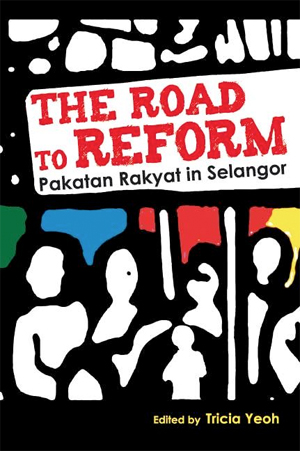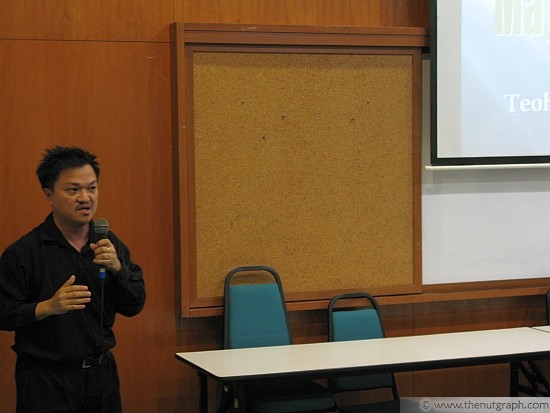
WHAT has the Pakatan Rakyat (PR) Selangor government achieved after two and a half years in power? If one relied on traditional media reports or Umno’s “Save Selangor” roadshow, the answer may well be, “Not very much”.
But the reality is much more nuanced, as demonstrated in the book The Road to Reform: Pakatan Rakyat in Selangor, a compilation of articles by academics, activists and politicians on Selangor’s performance.
Selangor’s achievements and struggles since taking power in March 2008 are summarised fairly comprehensively in The Road to Reform, published by Strategic Information and Research Development Centre (SIRD). Edited by Selangor Menteri Besar’s research officer Tricia Yeoh, it provides a broad overview of how Malaysia’s “richest and most developed state” has fared under a non-Barisan Nasional (BN) government for the first time in over 50 years.
The Good
Generally, authors were encouraged by the new government’s efforts at governing in a more open and democratic manner thus far. One oft-cited example was the setting up of the Select Committee on Competency, Accountability and Transparency (Selcat).
Other measures also received approval. Amongst them: The drafting of a Freedom of Information Act, declassifying documents under the Official Secrets Act and the exposure of Biro Tata Negara‘s controversial courses.

Federation of Malaysian Manufacturers past president Yong Poh Kon wrote of the state government’s greater willingness to engage stakeholders in discussions.
Centre for Orang Asli Concerns coordinator Colin Nicholas gave a glowing review of the Selangor government’s concrete steps and greater openness in addressing Orang Asli concerns in the state. “The PR-led Selangor government had from the beginning clearly stated its good intentions for the Orang Asli in the state — and it has followed through by walking the talk,” wrote Nicholas.
For political scientist Wong Chin Huat, the real significance of the 8 March 2008 election results was the opportunity to reaffirm federalism, which has been eroded since Malaysia’s formation. As Wong has stated before in his column Uncommon Sense, federalism allows for regional variation and competition. Selangor’s institutional reforms thus puts pressure not just on BN federal and state governments, but also on other PR states.
“It especially pressures Penang,” said Wong, “which is equally urbanised, developed and claiming to be reformist, and Kelantan, which has failed to even form a task force on FOI or local elections after 20 years in power.”

Academician Dr Mavis Puthucheary also noted that having chief ministers from different parties in the PR states has allowed for greater flexibility in government decision-making. This has allowed each state to develop policies that the local leaders believe are in the state’s best interests.
“As the richest state in Malaysia, the Selangor government is in a unique position to show that the only way to counter the challenges of globalisation — rise of job insecurity, financial volatility and corruption — is by good governance,” says Puthucheary. “In this way, states like Selangor may be able to influence decision-making at the national level.”
The Bad
But not all is rosy in Selangor. Bar Council Human Rights Committee chairperson Andrew Khoo summarised civil society’s assessment of Selangor’s performance as “still waiting”. Although signs have been encouraging, tangible results still need to be seen.
Several contributors commented on PR’s leaders’ lack of experience in governing and the need to transition from being the opposition to acting as the government. Institute of South East Asian Studies Fellow Ooi Kee Beng commented that opposition politics has for a long-time been a self-sacrificing undertaking. This has created a “street-fighting culture” among non-BN politicians and parties.

Former Bar Council president Yeo Yang Poh, while commending the Selangor government’s efforts, also said “its political will has not been matched by its speed or efficacy.” Some of the reasons for this are internal, such as in-fighting and a lack of decisiveness. Others are external, such as a lack of cooperation from the BN federal government. Law professor Dr Abdul Aziz Bari recalled how Agriculture Minister Datuk Seri Noh Omar forbade ministry officials from attending meetings or courses sponsored by PR state governments.
Environmental activist Gurmit Singh questioned whether the Selangor government can sustain the political will needed to ensure sustainable development in the state.

But most worryingly, several authors wrote of the risk that PR will emulate BN-style patronage politics and practices now that they have tasted power.
Wong criticised PR for denying BN opposition lawmakers their constituency development funds. PR justifies by saying BN lawmakers would be receiving double allocation — one from the state and one from their party. Also, it is widely known that BN denies opposition members of Parliament funds at the federal level. But Wong asks: “How can Pakatan Rakyat claim to revolutionise politics if it does what Barisan Nasional did when in power?” From asking for government jobs to denying opposition lawmakers funds, Wong warns that PR is looking increasingly like the BN.
The Ugly?
The book, however, does not address several key concerns about PR and Selangor. One recurring thread is how DAP and PAS work together when they appear to have conflicting aims on several Islamic issues.

In 2009, PAS state chief Datuk Dr Hassan Ali had a public spat with fellow executive council member Ronnie Liu over the sale of beer in Selangor. Although the issue was resolved through a compromise, doubts remain over whether PAS and DAP can truly cooperate, or whether one party’s asprations will eventually overshadow the other. Jostling within Parti Keadilan Rakyat, especially between Khalid and vice-president Mohamed Azmin Ali, which could prove harmful to the state’s administration, was also not sufficiently addressed.
PR’s reputation also took a beating over illegal sand-mining in the state as well as the issuance of “support letters” for friends and family members to obtain government contracts. Doubts have been cast on PR’s “clean” image due to these events although they may have been too recent for inclusion in this book.
New politics

Malaysians and Selangor residents took a risk on 8 March 2008 by putting relatively inexperienced representatives in government. It appears that in many aspects, this risk has been justified in Selangor by the government’s willingness to try a different way of governance — one that is more open, democratic and consultative.
But the PR government should not rest on its laurels nor should it have room for complacency with such an expectant electorate.
As Khoo said in his article, “Boldness and courage of the electorate in voting for change should not be rewarded by timidity, by the focusing on the excuses as to why it was not possible to deliver… Two years is time enough to have got off the blocks. Now it must pick up speed and run and finish well.” ![]()
The Road to Reform: Pakatan Rakyat in Selangor will be launched at 7.30pm on Monday, 27 September 2010 at Hotel Singgahsana, Persiaran Barat, off Jalan Sultan, Petaling Jaya (next to Taman Jaya LRT Station). All are welcome.
The Nut Graph needs your support


Roscoe says
I think Pakatan is afflicted with the problem of quality of their reps. The BN have better qualified leaders, and their losses in Selangor are due to the perceived corruption rampant among their ranks. The arrogance of the previous MBs and other leaders in flaunting their ill-gotten gains and their disdain for their voters’ sentiment regarding this became their undoing.
But with power the rabbles in the Pakatan ranks forget their responsibility and are beginning to show their greedy streak. They are given to infighting and clamouring for positions in the party and government. If the leaderships in the different components do not address the problems, I think they can expect a rude reception come the next election.
lee wee tak says
Pertaining to denying BN state allocation, I disagree that this is the ugly side of PR. The reason given by PR is absolutely correct.
If the above shows the worst of PR, I’ll take [the coalition] anytime. It pales in comparison to the bailouts, the human rights and corruption issues, etc
The legacy of Mahathirism is apparent even in PR, but can we really change things by keeping BN in? Even if PR is not good enough, a term in federal wilderness will give the BN a chance to truly reflect and reform, if they are able to do so.
Robert Lam says
Ding Jo-Ann probably wears the BN hat more than a neutral observer. Why the bad and ugly when there are uglier situations in BN-ruled states, as well as during Khir Toyo’s reign? The water and sand-mining issues were brought up without giving the actual facts of the case. With the declassified water and sand-mining documents, it clearly showed that there are elements of cronyism and corruption involved with Khir Toyo at the helm.
What is meant by the PR is “inexperienced in ruling the state”? If it means inexperience in being corrupt, I would agree, but certainly not in administering the state. How, then, can the PR-ruled state save millions and provide residents in Selangor with 20m3 free water?
Did the author also mean that other BN state governments have better and capable politicians to run the state? Look at Terengganu, Perak, Perlis, Pahang and Johor. What of the stadium roof collapse in Terengganu, a state ruled by an experienced BN politician? How did the PKFZ lose billions, yet no one commented on the ability of the experienced BN administration?
Ding Jo-Ann says
Thank you for your comments. The above article was quite clearly a commentary cum book review on the book “The Road to Reform” which examines Pakatan Rakyat’s performance in Selangor thus far. It was not intended as a comparative study of all state governments, whether current or previous. The fact that there may be BN-ruled states with uglier situations should not preclude us from examining PR’s performance critically, as has been done in this book.
The Selangor government has in fact welcomed the constructive criticism contained in this book. How else will it improve, if it does not listen to views on how it could do better? Valid criticisms of the PR government should not be withheld just because there may be other state governments that are doing worse. This would perpetuate the culture of defensiveness with politicians just pointing fingers at “worser culprits” when they are criticised.
7tony says
The valuable views presented in this article speak volumes. [Buck] up, Pakatan. The GE13 is just round the corner.
mike says
PR’s declared position is to be more consultative. However, the very heart of this party does not show such tendencies. Internal squabbles resulting in banishment of individuals does not bode well for any political party (see ‘The Ugly’ section). Especially one that professes a willingness to be consultative and open to differing views. If they resort to such actions with their members, what more with those who are not part of their so-called ‘broad church’?
What we see in Pakatan Rakyat, as well as the other political parties in Malaysia, is electocracy — not necessarily democracy. There is a distinct lack of accountability by the local government to the governed.
For PR to be elected again, there is a need for clear metrics to measure progress. This party would like us to believe there is no need for one, because it is good for the party (they don’t have to account for failures), but bad for us, the electorate (we just keep waiting for them to perform).
My advice to those who voted for PR in the last election: Always ask for a manifesto, don’t just vote in protest.